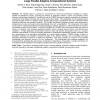23 search results - page 2 / 5 » Compiler Support to Customize the Mark and Sweep Algorithm |
CGO
2007
IEEE
14 years 2 days ago
2007
IEEE
The JavaTM programming language does not allow the programmer to influence memory management. An object is usually allocated on the heap and deallocated by the garbage collector ...
FPGA
2011
ACM
12 years 9 months ago
2011
ACM
In this paper, we introduce a new open source high-level synthesis tool called LegUp that allows software techniques to be used for hardware design. LegUp accepts a standard C pro...
WOSP
1998
ACM
13 years 10 months ago
1998
ACM
The POEMS project is creating an environment for end-to-end performance modeling of complex parallel and distributed systems, spanning the domains of application software, runti...
SIGMETRICS
2004
ACM
13 years 11 months ago
2004
ACM
This paper explores and quantifies garbage collection behavior for three whole heap collectors and generational counterparts: copying semi-space, mark-sweep, and reference counti...
COMPCON
1995
IEEE
13 years 9 months ago
1995
IEEE
This paper describes Tempest, a collection of mechanisms for communication and synchronization in parallel programs. With these mechanisms, authors of compilers, libraries, and ap...

